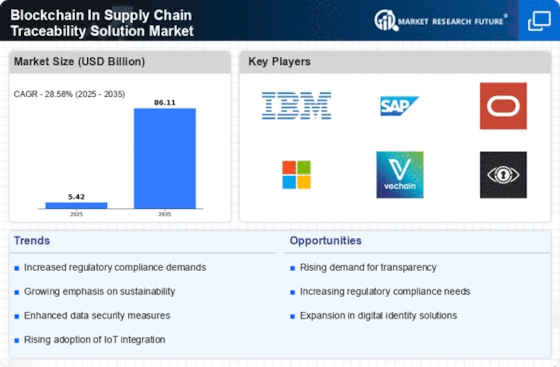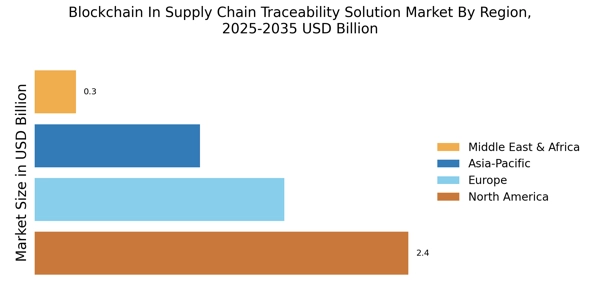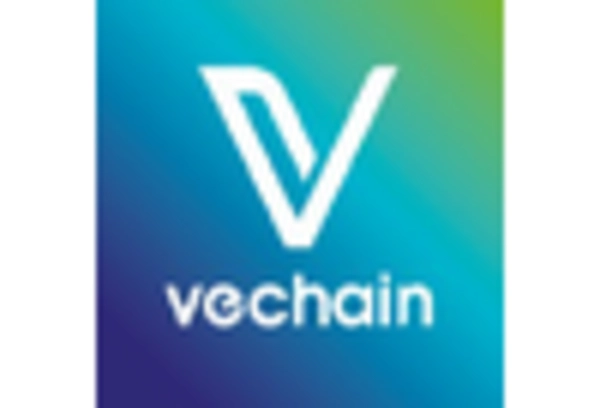Enhanced Transparency and Accountability
The Blockchain In Supply Chain Traceability Solution Market is witnessing a surge in demand for enhanced transparency and accountability. Stakeholders are increasingly recognizing the importance of tracking products throughout their lifecycle. This technology allows for real-time visibility into the supply chain, enabling companies to verify the authenticity of products and ensure compliance with regulations. According to recent estimates, the market for blockchain solutions in supply chain traceability is projected to reach USD 9.6 billion by 2025, reflecting a compound annual growth rate of approximately 48.37%. This growth is driven by the need for businesses to build trust with consumers and partners, as well as to mitigate risks associated with fraud and counterfeiting.
Regulatory Compliance and Risk Management
Regulatory compliance is a critical driver for the Blockchain In Supply Chain Traceability Solution Market. As governments and regulatory bodies impose stricter guidelines on product safety and traceability, companies are compelled to adopt blockchain solutions to meet these requirements. The ability to maintain an immutable record of transactions and product movements not only aids in compliance but also enhances risk management strategies. In sectors such as food and pharmaceuticals, where safety is paramount, blockchain technology provides a robust framework for tracking and tracing products. This compliance-driven approach is expected to propel the market, with estimates suggesting a significant increase in adoption rates among industries facing stringent regulations.
Technological Advancements and Integration
Technological advancements play a crucial role in the Blockchain In Supply Chain Traceability Solution Market. The integration of blockchain with other emerging technologies, such as the Internet of Things (IoT) and artificial intelligence (AI), is enhancing the capabilities of supply chain traceability solutions. These integrations allow for automated data collection and analysis, improving efficiency and accuracy in tracking products. As companies increasingly adopt these technologies, the market is expected to expand significantly. The convergence of blockchain with IoT, for instance, enables real-time monitoring of goods, which is likely to attract more businesses seeking to optimize their supply chain operations.
Consumer Demand for Authenticity and Quality
The rising consumer demand for authenticity and quality is a pivotal factor influencing the Blockchain In Supply Chain Traceability Solution Market. As consumers become more discerning, they seek assurance regarding the origin and quality of products. Blockchain technology facilitates this by providing verifiable information about product sourcing, manufacturing processes, and supply chain practices. This trend is particularly evident in sectors such as food and luxury goods, where consumers are willing to pay a premium for verified authenticity. Market Research Future indicates that brands leveraging blockchain for traceability can enhance customer loyalty and trust, thereby driving sales and market share.
Increased Investment in Supply Chain Innovation
Investment in supply chain innovation is a driving force behind the Blockchain In Supply Chain Traceability Solution Market. Companies are recognizing the need to modernize their supply chain processes to remain competitive. This has led to increased funding for blockchain initiatives aimed at enhancing traceability and efficiency. Venture capital and corporate investments in blockchain startups are on the rise, indicating a strong belief in the potential of this technology to transform supply chains. As organizations allocate resources towards innovative solutions, the market is poised for substantial growth, with projections indicating a robust increase in the adoption of blockchain technologies across various sectors.

















